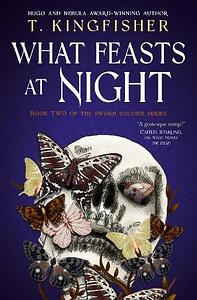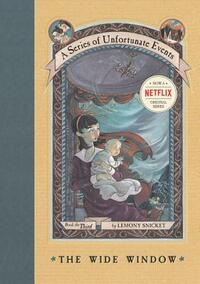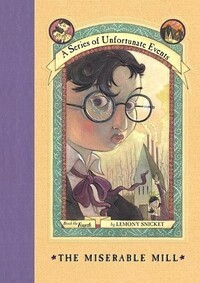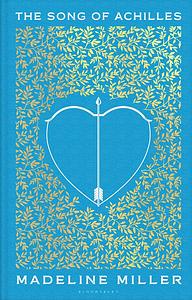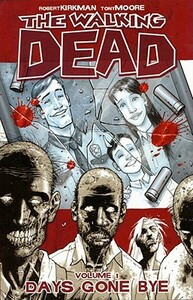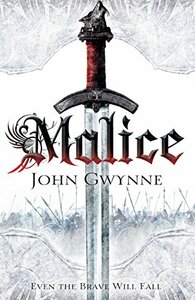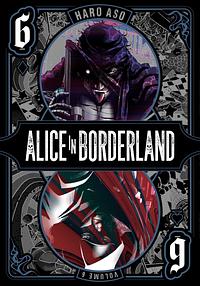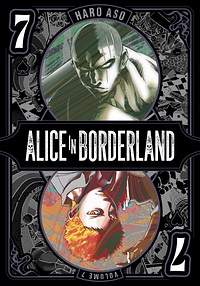You need to sign in or sign up before continuing.
Take a photo of a barcode or cover
lefttoread's Reviews (532)
I was thrilled to receive an ARC of What Feasts at Night through NetGalley, especially after falling in love with T. Kingfisher's What Moves the Dead. Kingfisher has a knack for crafting eerie, atmospheric tales that crawl under your skin, and I was excited to dive into another one of her works.
The writing in What Feasts at Night lived up to my expectations. Kingfisher excels at setting a chilling, immersive scene, and she paints her worlds with a vivid brush.
However, I found myself not quite as hooked on What Feasts at Night as I was with What Moves the Dead. The pacing in this one was uneven for me—at times, it would build up wonderfully, but then it would slow down in ways that pulled me out of the story. There were sections that I found less engaging, and I struggled to stay invested during those lulls. This inconsistency made it harder for me to fully lose myself in the book.
That said, I still think Kingfisher is a master of the creepy and the unsettling, and I'd happily read more of her work in the future.
The writing in What Feasts at Night lived up to my expectations. Kingfisher excels at setting a chilling, immersive scene, and she paints her worlds with a vivid brush.
However, I found myself not quite as hooked on What Feasts at Night as I was with What Moves the Dead. The pacing in this one was uneven for me—at times, it would build up wonderfully, but then it would slow down in ways that pulled me out of the story. There were sections that I found less engaging, and I struggled to stay invested during those lulls. This inconsistency made it harder for me to fully lose myself in the book.
That said, I still think Kingfisher is a master of the creepy and the unsettling, and I'd happily read more of her work in the future.
The Wide Window, the third installment in Lemony Snicket's A Series of Unfortunate Events, continues the adventures (or rather, misadventures) of the Baudelaire orphans in a familiar pattern. While it retains the playful language and dark humor, it seems to lose some of the magic that made the first two books so captivating.
This time, the Baudelaire orphans find themselves in the care of Aunt Josephine, a well-meaning but highly neurotic woman who is terrified of just about everything—from real dangers like Count Olaf, who continues his relentless pursuit of the orphans, to ridiculous fears like refrigerators and doorknobs. The adults in this series have always been flawed, but in The Wide Window, their incompetence seem excessively unrealistic, making it harder to suspend disbelief and fully engage with the story.
Aunt Josephine, in particular, is an incredibly frustrating character. Her constant grammar corrections and irrational fears become more irritating than endearing, and at times, the narrative feels weighed down by it all. Her decisions and actions push the boundary of believability to the point where it becomes difficult to feel sympathy for her or to take her seriously as a guardian figure.
Overall, while it remains a quirky read with some charm, I’m not entirely convinced that the series holds up as a whole. The novelty seems to wear thin in The Wide Window, and with the increasingly unrealistic behavior of the adults, it's hard to stay fully invested.
This time, the Baudelaire orphans find themselves in the care of Aunt Josephine, a well-meaning but highly neurotic woman who is terrified of just about everything—from real dangers like Count Olaf, who continues his relentless pursuit of the orphans, to ridiculous fears like refrigerators and doorknobs. The adults in this series have always been flawed, but in The Wide Window, their incompetence seem excessively unrealistic, making it harder to suspend disbelief and fully engage with the story.
Aunt Josephine, in particular, is an incredibly frustrating character. Her constant grammar corrections and irrational fears become more irritating than endearing, and at times, the narrative feels weighed down by it all. Her decisions and actions push the boundary of believability to the point where it becomes difficult to feel sympathy for her or to take her seriously as a guardian figure.
Overall, while it remains a quirky read with some charm, I’m not entirely convinced that the series holds up as a whole. The novelty seems to wear thin in The Wide Window, and with the increasingly unrealistic behavior of the adults, it's hard to stay fully invested.
In The Miserable Mill, the fourth installment of Lemony Snicket's "A Series of Unfortunate Events," the ridiculous continues, but this time, it seems to cross a line.
While the series has always embraced a blend of gothic fantasy and dark comedy, The Miserable Mill takes these elements to an extreme that leans more toward the outright silly. The adult characters, who have always been comically inept, reach a new level of frustration here — their lack of logic and reason becomes less entertaining and more exasperating.
Unfortunately, this book made me take a break from the series. The absurdity, rather than adding to the charm, became a bit too much to swallow.
While the series has always embraced a blend of gothic fantasy and dark comedy, The Miserable Mill takes these elements to an extreme that leans more toward the outright silly. The adult characters, who have always been comically inept, reach a new level of frustration here — their lack of logic and reason becomes less entertaining and more exasperating.
Unfortunately, this book made me take a break from the series. The absurdity, rather than adding to the charm, became a bit too much to swallow.
The Song of Achilles" by Madeline Miller was an unexpected gateway into a world I had never fully explored before—Greek mythology. As someone who wasn't previously familiar with this genre, I found this book remarkably accessible and easy to read. While this may not have been the most perfect book I’ve ever read, it did exactly what I needed it to do. Thanks to The Song of Achilles, I want to read more Greek mythology, so much so that I want to start from the beginning. I’m grateful for how this story has opened up a whole new genre of literature for me. That, I think, is the mark of a truly good book.
Having first read and watched The Walking Dead back in 2017, I made the decision to pick both back up again this year. Back in 2017 I read a few volumes and watched 7 seasons of the adaptation.
Although the comic still stands on it's own, I've found that I'm more interested in carrying on with just the adaptation this time around.
Although the comic still stands on it's own, I've found that I'm more interested in carrying on with just the adaptation this time around.
Game of Thrones — but better? Absolutely. Malice by John Gwynne was everything I wanted and more. While it has been frequently compared to Game of Thrones, I found myself far more engrossed in this story, for two reasons: Gwynne stays true to the fantasy roots and I felt more connected to the characters in Malice. Unlike Game of Thrones, which I think sometimes forgets that it's meant to be a fantasy story, especially after the first book in the series, Malice embraces its fantasy elements fully.
The characters are what truly captured my heart. Gwynne crafts them with such care, depth, and authenticity that I couldn't help but become deeply invested in their journeys. I found myself rooting for them, feeling their pain, and celebrating their victories. There’s real growth and character development, a sense of purpose and evolution that made me care for them. I genuinely want nothing but the best for most of them, and that's a rare feeling in epic fantasy with multiple POVs. One POV in particular stood out for me though. Corban —what a character! I'm so excited to see where his journey leads next. He is easily one of my favorite characters, and I can't wait to continue this series and follow his path.
The book is filled with everything I love: exquisite world-building, amazing fantasy elements that still feel grounded in a sense of reality, and top-tier character dynamics that had me hooked from the start. John Gwynne has set a high bar with Malice, and I'm excited for the rest of the series.
The characters are what truly captured my heart. Gwynne crafts them with such care, depth, and authenticity that I couldn't help but become deeply invested in their journeys. I found myself rooting for them, feeling their pain, and celebrating their victories. There’s real growth and character development, a sense of purpose and evolution that made me care for them. I genuinely want nothing but the best for most of them, and that's a rare feeling in epic fantasy with multiple POVs. One POV in particular stood out for me though. Corban —what a character! I'm so excited to see where his journey leads next. He is easily one of my favorite characters, and I can't wait to continue this series and follow his path.
The book is filled with everything I love: exquisite world-building, amazing fantasy elements that still feel grounded in a sense of reality, and top-tier character dynamics that had me hooked from the start. John Gwynne has set a high bar with Malice, and I'm excited for the rest of the series.
Volume 6 of Alice in Borderland is one of my favourites of the series, although this is a pretty highly rated series all in all from me. Haro Aso is great at blending psychological depth with high-stakes action.
The characters continue to shine, with each one bringing a unique dynamic to the group. The depth of their development is remarkable, making you care deeply about their fates as they navigate the brutal world of Borderland.
The TV adaptation of Alice in Borderland does justice to the show too, as I've said many times before, capturing the essence of the story while staying true to its core themes. The show's visual style and pacing are on point, mirroring the tension and excitement of the manga. It's a rare case where both mediums complement each other beautifully, enhancing the experience for fans of the story and I would recommend both equally.
The characters continue to shine, with each one bringing a unique dynamic to the group. The depth of their development is remarkable, making you care deeply about their fates as they navigate the brutal world of Borderland.
The TV adaptation of Alice in Borderland does justice to the show too, as I've said many times before, capturing the essence of the story while staying true to its core themes. The show's visual style and pacing are on point, mirroring the tension and excitement of the manga. It's a rare case where both mediums complement each other beautifully, enhancing the experience for fans of the story and I would recommend both equally.
What Works
Cosby’s strength clearly lies in his ability to craft intense, hard-boiled action scenes. His writing has a raw, unapologetic edge that makes the violence and tension feel palpable, reminiscent of classic noir but with a distinctly Southern twist.
Cosby also succeeds in creating a protagonist who is intriguing, if somewhat familiar within the genre. Nathan Waymaker is a flawed, morally ambiguous character who fits well into the world Cosby has built. His background as a former law enforcement officer and his current status as a funeral home worker add a unique element to the story, providing dark humor that works well for a noir narrative.
What Falls Short
Where the novel falters is in character descriptions, particularly when it comes to the female characters. Each female character except for one maybe, was sexualised. It had that typical male gaze feel to it whenever a female character was introduced.
Overall Impression
As a debut novel, My Darkest Prayer showcases S.A. Cosby’s potential as a writer of gritty crime fiction. His ability to convey atmosphere and tension is impressive, and despite the flaws, it’s a solid entry into the genre and suggests that Cosby has much to offer in future works.
Cosby’s strength clearly lies in his ability to craft intense, hard-boiled action scenes. His writing has a raw, unapologetic edge that makes the violence and tension feel palpable, reminiscent of classic noir but with a distinctly Southern twist.
Cosby also succeeds in creating a protagonist who is intriguing, if somewhat familiar within the genre. Nathan Waymaker is a flawed, morally ambiguous character who fits well into the world Cosby has built. His background as a former law enforcement officer and his current status as a funeral home worker add a unique element to the story, providing dark humor that works well for a noir narrative.
What Falls Short
Where the novel falters is in character descriptions, particularly when it comes to the female characters. Each female character except for one maybe, was sexualised. It had that typical male gaze feel to it whenever a female character was introduced.
Overall Impression
As a debut novel, My Darkest Prayer showcases S.A. Cosby’s potential as a writer of gritty crime fiction. His ability to convey atmosphere and tension is impressive, and despite the flaws, it’s a solid entry into the genre and suggests that Cosby has much to offer in future works.
This book had me unexpectedly hooked—not just by the love story, but by the sport itself. As someone new to the sports romance genre, I found myself genuinely interested in the world of hockey, I actually wish we could have had more of that side of things.
The romance between the main characters is compelling and beautifully crafted. Tomforde doesn't just give us a surface-level love story; she delves deep into the nuances of their relationship, exploring how personal challenges like body confidence and mental health, as well as family dynamics and how family involvement can effect relationships.
Overall, Mile High is a solid romance novel that brings more to the table than just swoon-worthy moments (although there's plenty of those too). It touches on significant topics with sensitivity and realism, making it a standout read.
The romance between the main characters is compelling and beautifully crafted. Tomforde doesn't just give us a surface-level love story; she delves deep into the nuances of their relationship, exploring how personal challenges like body confidence and mental health, as well as family dynamics and how family involvement can effect relationships.
Overall, Mile High is a solid romance novel that brings more to the table than just swoon-worthy moments (although there's plenty of those too). It touches on significant topics with sensitivity and realism, making it a standout read.
Volume 7 of Alice in Borderland takes a detour from the main storyline, and while I genuinely enjoy this series, I found this particular volume a bit jarring. The narrative pulls us away from the central plot, which, although it's interesting, it disrupts the momentum of the primary storyline.
I feel these side stories would have been more effective as standalone tales or short stories released after the main series concluded, rather than being inserted in the middle. This interruption breaks the flow of an otherwise tightly paced narrative, and it can feel like a distraction when you're eager to see what happens next in the main plot.
Interestingly, the TV adaptation handled this better; the flow felt more seamless. That said, Alice in Borderland remains a highly enjoyable series overall. Even with this volume’s detour, the compelling world-building and intriguing character arcs continue to shine through.
I feel these side stories would have been more effective as standalone tales or short stories released after the main series concluded, rather than being inserted in the middle. This interruption breaks the flow of an otherwise tightly paced narrative, and it can feel like a distraction when you're eager to see what happens next in the main plot.
Interestingly, the TV adaptation handled this better; the flow felt more seamless. That said, Alice in Borderland remains a highly enjoyable series overall. Even with this volume’s detour, the compelling world-building and intriguing character arcs continue to shine through.
